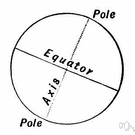equator
Also found in: Thesaurus, Medical, Acronyms, Idioms, Encyclopedia, Wikipedia.
e·qua·tor
(ĭ-kwā′tər)n.
1.
a. The imaginary great circle around the earth's surface, equidistant from the poles and perpendicular to the earth's axis of rotation. It divides the earth into the Northern Hemisphere and the Southern Hemisphere.
b. A similar great circle drawn on the surface of a celestial body at right angles to the axis of rotation.
2. The celestial equator.
3. A circle that divides a sphere or other surface into congruent parts.
[Middle English, from Medieval Latin aequātor (diēī et noctis), equalizer (of day and night), from Latin aequāre, to equalize; see equate.]
American Heritage® Dictionary of the English Language, Fifth Edition. Copyright © 2016 by Houghton Mifflin Harcourt Publishing Company. Published by Houghton Mifflin Harcourt Publishing Company. All rights reserved.
equator
(ɪˈkweɪtə)n
1. (Physical Geography) the great circle of the earth with a latitude of 0°, lying equidistant from the poles; dividing the N and S hemispheres
2. (Mathematics) a circle dividing a sphere or other surface into two equal symmetrical parts
3. (General Physics) See magnetic equator
4. (Astronomy) astronomy See celestial equator
[C14: from Medieval Latin (circulus) aequātor (diei et noctis) (circle) that equalizes (the day and night), from Latin aequāre to make equal]
Collins English Dictionary – Complete and Unabridged, 12th Edition 2014 © HarperCollins Publishers 1991, 1994, 1998, 2000, 2003, 2006, 2007, 2009, 2011, 2014
e•qua•tor
(ɪˈkweɪ tər)n.
1. the great circle on a sphere or heavenly body whose plane is perpendicular to the axis and everywhere equidistant from the poles.
2. the great circle of the earth that is equidistant from the North Pole and South Pole.
3. a circle separating a surface into two congruent parts.
[1350–1400; Middle English < Medieval Latin aequātor, Latin: equalizer (of day and night, as when the sun crosses the equator). See equate, -tor]
Random House Kernerman Webster's College Dictionary, © 2010 K Dictionaries Ltd. Copyright 2005, 1997, 1991 by Random House, Inc. All rights reserved.
e·qua·tor
(ĭ-kwā′tər)1. The imaginary line forming a great circle around the Earth's surface halfway between the North and South poles. It divides the Earth into the Northern Hemisphere and the Southern Hemisphere.
2. A similar circle on the surface of any celestial body.
The American Heritage® Student Science Dictionary, Second Edition. Copyright © 2014 by Houghton Mifflin Harcourt Publishing Company. Published by Houghton Mifflin Harcourt Publishing Company. All rights reserved.
Equator
two points on the surface of the earth diametrically opposite each other. — antipodean, n. , adj.
persons living on opposite sides of the equator but in the same longitude whose shadows at noon fall in opposite directions.
-Ologies & -Isms. Copyright 2008 The Gale Group, Inc. All rights reserved.
equator
An imaginary line around the Earth midway between the poles.
Dictionary of Unfamiliar Words by Diagram Group Copyright © 2008 by Diagram Visual Information Limited
ThesaurusAntonymsRelated WordsSynonymsLegend:
Switch to new thesaurus
| Noun | 1. |  equator - an imaginary line around the Earth forming the great circle that is equidistant from the north and south poles; "the equator is the boundary between the northern and southern hemispheres" equator - an imaginary line around the Earth forming the great circle that is equidistant from the north and south poles; "the equator is the boundary between the northern and southern hemispheres"great circle - a circular line on the surface of a sphere formed by intersecting it with a plane passing through the center |
| 2. | equator - a circle dividing a sphere or other surface into two usually equal and symmetrical parts circle - ellipse in which the two axes are of equal length; a plane curve generated by one point moving at a constant distance from a fixed point; "he calculated the circumference of the circle" |
Based on WordNet 3.0, Farlex clipart collection. © 2003-2012 Princeton University, Farlex Inc.
Translations
خَط الإسْتِواءخَطُّ الِاسْتِواء
rovník
ækvator
päiväntasaaja
ekvator
egyenlítõ
miîbaugur
赤道
적도
ekvatorinisekvatoriuspusiaujaspusiaujo
ekvators
rovník
ekvator
ekvator
เส้นศูนย์สูตร
đường xích đạo
Collins Spanish Dictionary - Complete and Unabridged 8th Edition 2005 © William Collins Sons & Co. Ltd. 1971, 1988 © HarperCollins Publishers 1992, 1993, 1996, 1997, 2000, 2003, 2005
equator
[ɪˈkweɪtər] nthe equator → l'Équateur m
Collins English/French Electronic Resource. © HarperCollins Publishers 2005
Collins German Dictionary – Complete and Unabridged 7th Edition 2005. © William Collins Sons & Co. Ltd. 1980 © HarperCollins Publishers 1991, 1997, 1999, 2004, 2005, 2007
equator
[ɪˈkweɪtəʳ] n the equator → l'equatore mCollins Italian Dictionary 1st Edition © HarperCollins Publishers 1995
equator
(iˈkweitə) noun (with the) an imaginary line (or one drawn on a map etc) passing round the globe, at an equal distance from the North and South poles. Singapore is almost on the equator.
equatorial (ekwəˈtoːriəl) adjective of or near the equator. an equatorial climate.
Kernerman English Multilingual Dictionary © 2006-2013 K Dictionaries Ltd.
equator
→ خَطُّ الِاسْتِواء rovník ækvator Äquator ισημερινός ecuador päiväntasaaja équateur ekvator Equatore 赤道 적도 evenaar ekvator równik equador экватор ekvator เส้นศูนย์สูตร ekvator đường xích đạo 赤道Multilingual Translator © HarperCollins Publishers 2009
e·qua·tor
n. ecuador, línea imaginaria que divide un cuerpo en dos partes iguales.
English-Spanish Medical Dictionary © Farlex 2012

